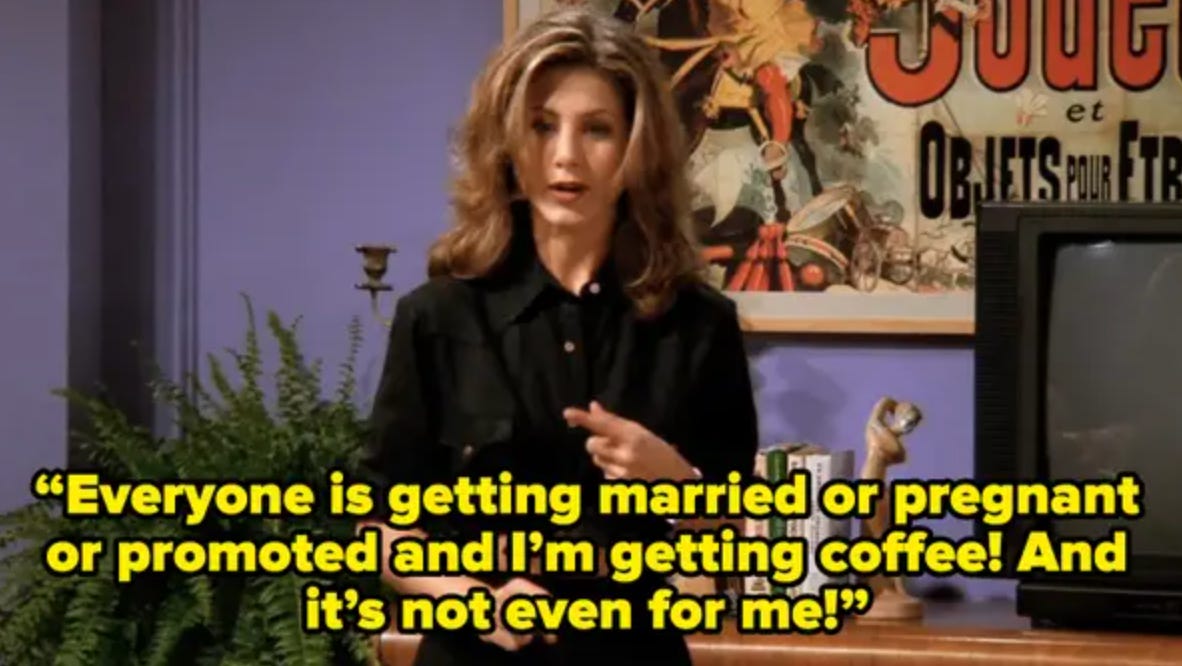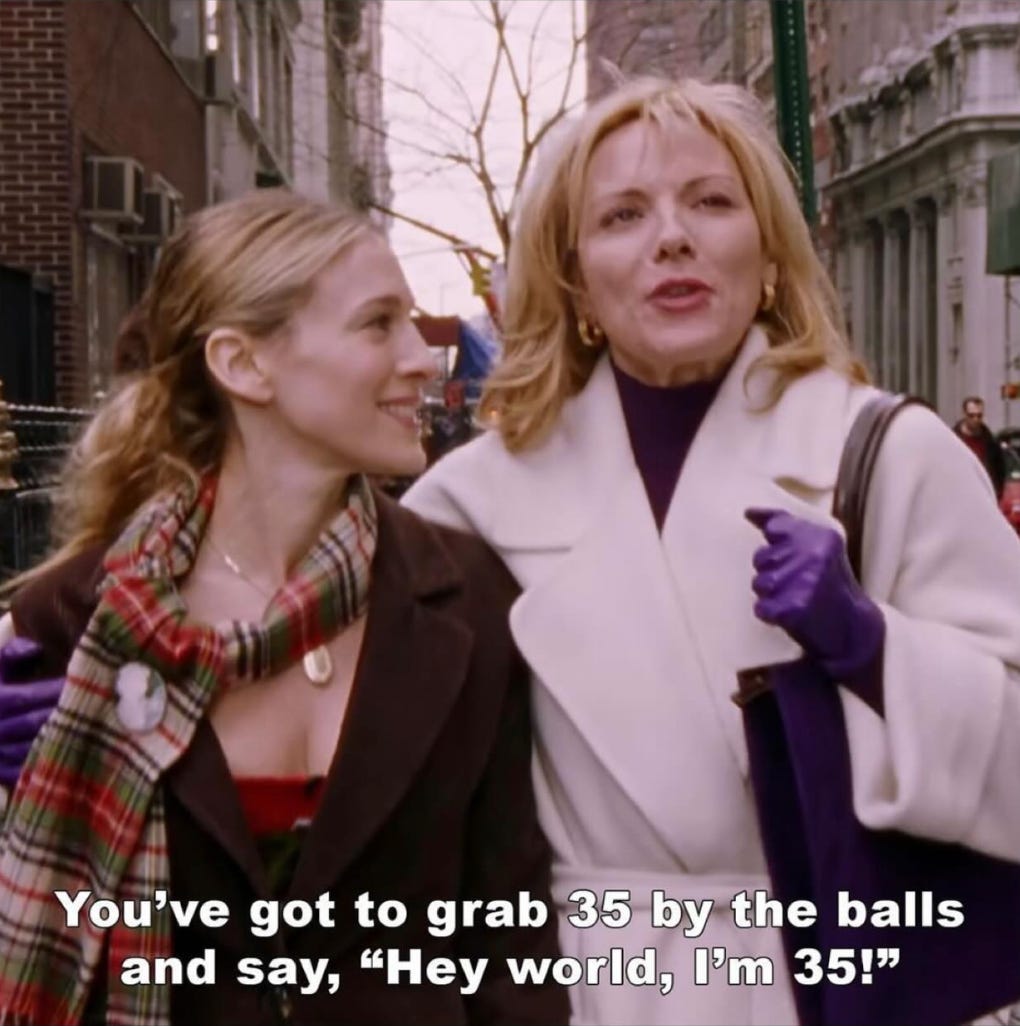Breaking the 'Too Old, Too Late' Myth
Embracing 35+: The Beginning of Your Best Years
I felt this deep in my bones four months before my 35th birthday: That I was running out of time. Suddenly, out of nowhere, I started to evaluate my life based on societal timelines instead of my own. I started comparing where I was to other women my age, and it left me feeling so far behind.
It felt like it happened overnight. Suddenly, I was ‘too old,’ not where I ‘should’ be, and ‘running out of time.’ I call it the scarcity trap.
But why? Why the sudden feeling of impending doom?
I had happily lived the previous 35 years mostly to the beat of my own drum. I had always been unconventional, and I embraced that way of living. Engaged twice, married and divorced before I was 28. Never owning a home or many possessions outside of what I could carry. Wandering the world. Connecting with people and allowing my multitude of passions to decide what direction I moved in. This was me. So why, out of nowhere, was I suddenly hit with this tidal wave of desperation?
The simple answer: society.
My whole life, society had been preparing me for this moment where, as a woman, I would begin to believe that my worth was diminishing. Every show I watched growing up reiterated this narrative, and every movie made about women of this age solidified it into my subconscious: once you hit 35, your value starts to decrease. Think Bridget Jones's Diary, Friends, and Sex and the City. I’ve recently revisited some of these shows to better understand why I, too, firmly believed that once I reached 35, I was running out of time.
While I deeply love these shows and movies, they are all littered with an air of scarcity. Scarcity about being in your mid-30s, and often even early 30s, and being single. The idea that you need to meet your partner before your mid-30s or you never will is strategically placed throughout. They highlight the notion that women 35+ are running out of time to get pregnant, with themes of a ticking biological clock always looming in the background.
We watch as our favourite characters deal with the pressure and anxiety created by this idea of running out of time. We see them compare their lives to those around them and grieve with them when they feel behind. Without realising, we see ourselves in them and embody this idea that once we hit our 30s, particularly our mid-30s, we should be in a relationship, starting a family, owning a home, excelling in our careers.
All of these shows and movies reflect societal pressures that women should achieve certain milestones—marriage, career success, children—by specific ages. In Western cultures, particularly, there’s an expectation that women’s lives should follow a certain path by their 30s, and I’ve been no exception to that pressure.
"The only thing worse than being 34 and single is being 34 and divorced." - Sex & The City
As I dove deeper into my research, I came across an article written by a male in the 50s that concluded women’s ‘shelf life’ began to rapidly expire after the age of 35. I also discovered that it has only been in recent years that we’ve replaced the term ‘geriatric pregnancy’ for women 35+ with the equally as flattering term ‘advanced maternal age.’ Ironically, ‘geriatric’ is most commonly associated with being ‘past your time.’ The use of such disempowering terms is often far more harmful to a woman than her age. The idea that she’s ‘too old’ places tremendous stress and pressure, when in reality, there are hundreds of reasons women face fertility issues, and age is a small percentage of this.
“Tom has a theory that homosexuals and single women in their thirties have natural bonding: both being accustomed to disappointing their parents and being treated as freaks by society.” - Bridget Jones Diary
Which is why I became curious about how we can change this narrative.
As a coach and mentor, I’ve been working with women for years on their self-worth, identity, self-expression, and alignment. Yet, it seems that very few women, if any at all, are exempt from this pressure around being in their 30s—and more specifically, 35+. Every empowered woman I know has faced this feeling at some point, and I’ve come to realise the way we can change the narrative is to talk about it. To be in community with one another. To listen to each other. To support one another and take away the shame and guilt that women feel about not being at a certain place at a certain stage in their life.
I also think it’s important to highlight that women really do just get better with age. A woman at 35 is far more empowered than a woman in her 20s. She has lived. She has healed. She has experienced. I know personally, I spent my 20s chasing validation outside of myself, placing my worth in the hands of others. It’s only been in my 30s that I’ve started to stop seeking that validation outwardly and instead find it within. I’m more comfortable in my skin in my 30s and more empowered to use my voice. I’m done with people-pleasing, and perhaps this is why society has continued this narrative for so long—to push us down and put us in our place so to say.
But you can’t push down a woman who doesn’t feel shame—and there’s absolutely no shame in aging. The more we rewrite this narrative, share our stories, and support one another, the less power this outdated idea will have over us. There’s nothing ‘too old’ or ‘too late’ about a woman in her mid-30s. In fact, she’s just getting started.
And as Samatha from Sex & The City said “You've got to grab 35 by the balls and say, "Hey, World, I'm 35!”
I’d love to hear from you! What societal pressure have your experienced around age and milestones?




